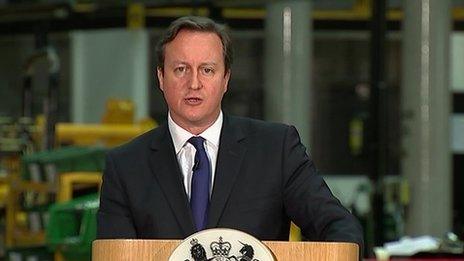David Cameron won't 'cave in' on migration target despite new figures
- Published
PM David Cameron says uncontrolled immigration can damage the labour market
David Cameron says he will not give up on his immigration target despite net migration to the UK reaching its highest level for a decade.
Net migration rose by 50% to 318,000 last year - with sharp increases from inside and outside the EU.
A total of 641,000 people moved to the UK in 2014, the Office for National Statistics said.
But the PM said he would not "cave in" and abandon his target of reducing net migration below 100,000.
Politics live: Cameron speech and immigration figures reaction
In a speech at the Home Office, he said the Liberal Democrats had held back Conservative attempts to reduce numbers during the last parliament and unveiled a string of measures aimed at curbing illegal working.
Central to these are new plans to seize the wages of illegal workers as proceeds of crime in an attempt to reduce the numbers.

Analysis by Ross Hawkins, BBC political correspondent
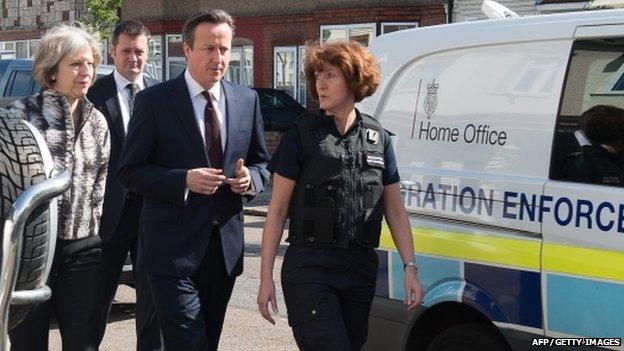
The prospect of reducing net migration to the tens of thousands is more distant now than it was when David Cameron first entered Number 10.
Having renewed his commitment to this "ambition" in the Conservative manifesto, he must now try to reverse a trend.
The government signalled its intent with a photocall this morning at the scene of an immigration raid, publicising a law designed to hit illegal migrant workers in the pocket.
Success or failure, though, will be dictated by reducing legal migration.

However, the scale of the challenge facing ministers in reducing levels of legal immigration was highlighted again by a net migration, external rise the size of the population of Coventry.
The figures measure the difference between the numbers of people moving the UK for a year or more and those leaving the UK for a year or more.
They reveal:
641,000 people moved to the UK over the period, with 323,000 going the other way
284,000 people immigrated for work, a 70,000 increase
The number of Romanian and Bulgarians moving to the UK doubled to 46,000 in 2014
Employment of non-British EU nationals in the UK in January to March 2015 was 283,000 higher than the previous year
The Conservatives pledged before the 2010 election to reduce numbers to less than 100,000, a target they acknowledge they have failed to meet.
"There is no good news here for David Cameron," said BBC assistant political editor Norman Smith.
He said ministers were shifting the emphasis of the immigration debate away from numbers towards "blue collar concerns" like jobs, pay and housing.

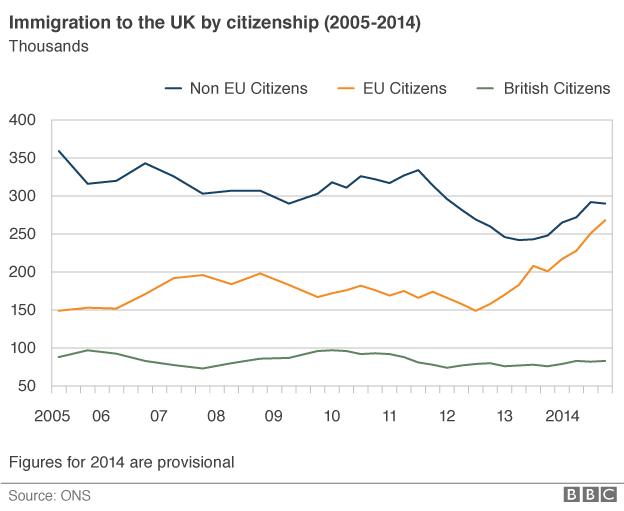
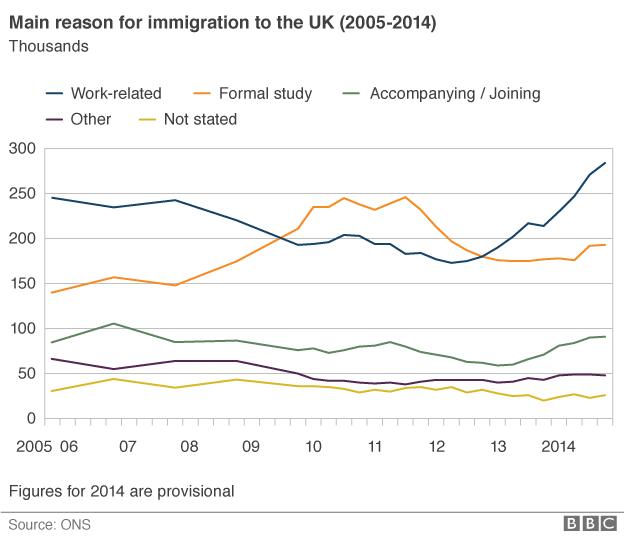
In a speech at the Home Office, Mr Cameron said: "Today's figures show how far we have to go to reach our goal."
Taking questions from journalists afterwards, he said: "There is the approach of just give up, cave in and forget about it.
"But that's not my approach."
He said a growing economy could be combined with lower immigration levels as it had been in the 1990s.
Conservative MP Mark Field said net migration was "uncontrollable" as long as Britain remained a member of the EU and was subject to freedom of movement rules.
He told BBC Radio 4's PM programme he wanted to remain in the union but hoped that Mr Cameron's negotiation would "make some difference in this migration issue, particularly in relation to welfare, making sure that it is contributory rather than there as of right".
Home Secretary Theresa May: "We want to crack down on those who have no right to be here"
Earlier, Mr Cameron visited a premises in Ealing, West London, shortly after it had been raided by immigration officials.
In his speech he said the government was determined to "control and reduce" immigration, saying criminalising illegal workers must go hand-in-hand with other measures to lower demand for migrant labour, such as boosting the skills of UK workers.
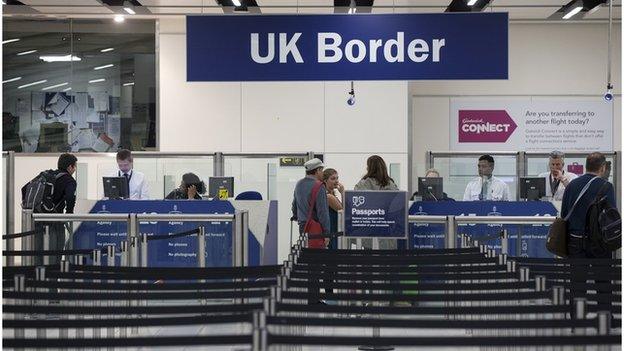
The Conservatives acknowledge they failed to meet a target for reducing net migration since 2010
The government says depriving illegal migrants of their wages will make it harder for them to remain in the UK.
A new criminal offence of illegal working will apply to migrants who have entered the country illegally and also those who came to the country legally but are in breach of their conditions or have overstayed.
At the moment, migrants with current leave to remain who are working illegally in breach of their conditions may be prosecuted and are liable, if convicted, to a six month custodial sentence and-or an unlimited fine.
But migrants who entered the UK illegally or have overstayed their leave are not subject to the same sanctions, and the police do not have the same powers of confiscation in all cases.

Analysis by Dominic Casciani, home affairs correspondent
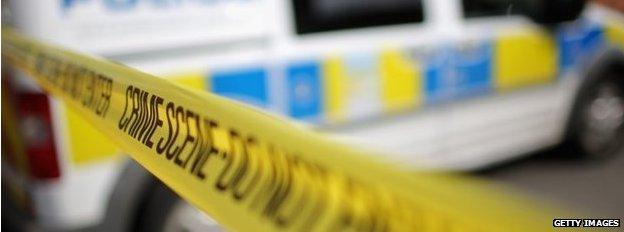
The police will be given enhanced powers under the government's proposals
If the government is going to clamp down on illegal workers, it needs to find them.
So how many illegal migrants are there in the UK? The simple truth is - nobody knows.
The best that we have are a series of academic guesses using various competing techniques of estimating what's going on.
The problem with all these estimates - and comparable calculations carried out by other big nations - is that nobody can really say whether they mean anything at all.
In 2012, the Home Office came close to nailing its colours to the mast when it published a paper on the subject. That analysis suggested the best guess is probably around 618,000 - but there is a huge range either side. It could be much lower - or much higher.

Among other proposed measures are new powers for councils to deal with unscrupulous landlords and to evict illegal migrants more quickly, while all foreign criminals awaiting deportation will be fitted with satellite tracking tags.
It will also become an offence for businesses and recruitment agencies to hire abroad without first advertising in the UK - a policy which featured prominently in Labour's election manifesto - and a new enforcement agency will be set up to tackle what the PM called "the worst cases of exploitation".
'Tackling exploitation'
Labour's shadow home secretary Yvette Cooper said Mr Cameron was "taking people for fools" with his immigration target.
"This massive gap between rhetoric and reality, between promise and delivery, just destroys trust in anything ministers say on immigration," she said.
Ms Cooper said the Conservatives had "attempted to copy" some of Labour's policies but said a new offence of "exploitation" was also needed.

Welfare demands
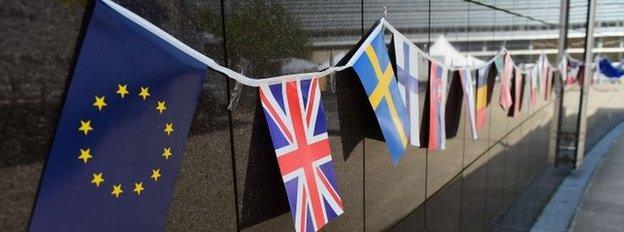
David Cameron wants to curb EU migration by reducing migrants' rights to claim benefits in the UK, including:
A four-year delay for EU migrants wishing to claim in-work benefits such as tax credits and getting access to social housing
Removing migrants from the UK after six months if they have not found work
Stopping EU jobseekers claiming Universal Credit

Liberal Democrat peer Lord Paddick said: "Theresa May needs to get it into her head - not all immigration is bad. If she was serious about cracking down on illegal immigration she should concentrate on what works and not tar all immigrants with the same brush."
UKIP immigration spokesman Steven Woolfe said the new announcements were a "smoke screen to mask today's appalling immigration statistics".
Don Flynn, of the Migrants' Rights Network, said seizing wages would force some people into "systems of modern slavery without hope of protection from the law".
Madeleine Sumption, of Oxford University's Migration Observatory, said net migration had risen "even despite new restrictions on family, work and student visas that were introduced during the last Parliament".
Lord Green, of Migration Watch, said: "We need to stop and think where this mass immigration is leading. It points to a probable increase of three million in the UK population over the next five years in the face of very strong public opinion."
The CBI said the planned exploitation taskforce should focus on criminal activity and not "blur the lines" with enforcing employment law.
- Published21 May 2015
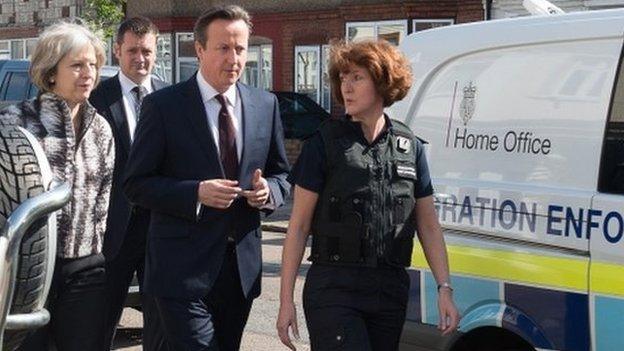
- Published27 March 2015

- Published26 February 2015
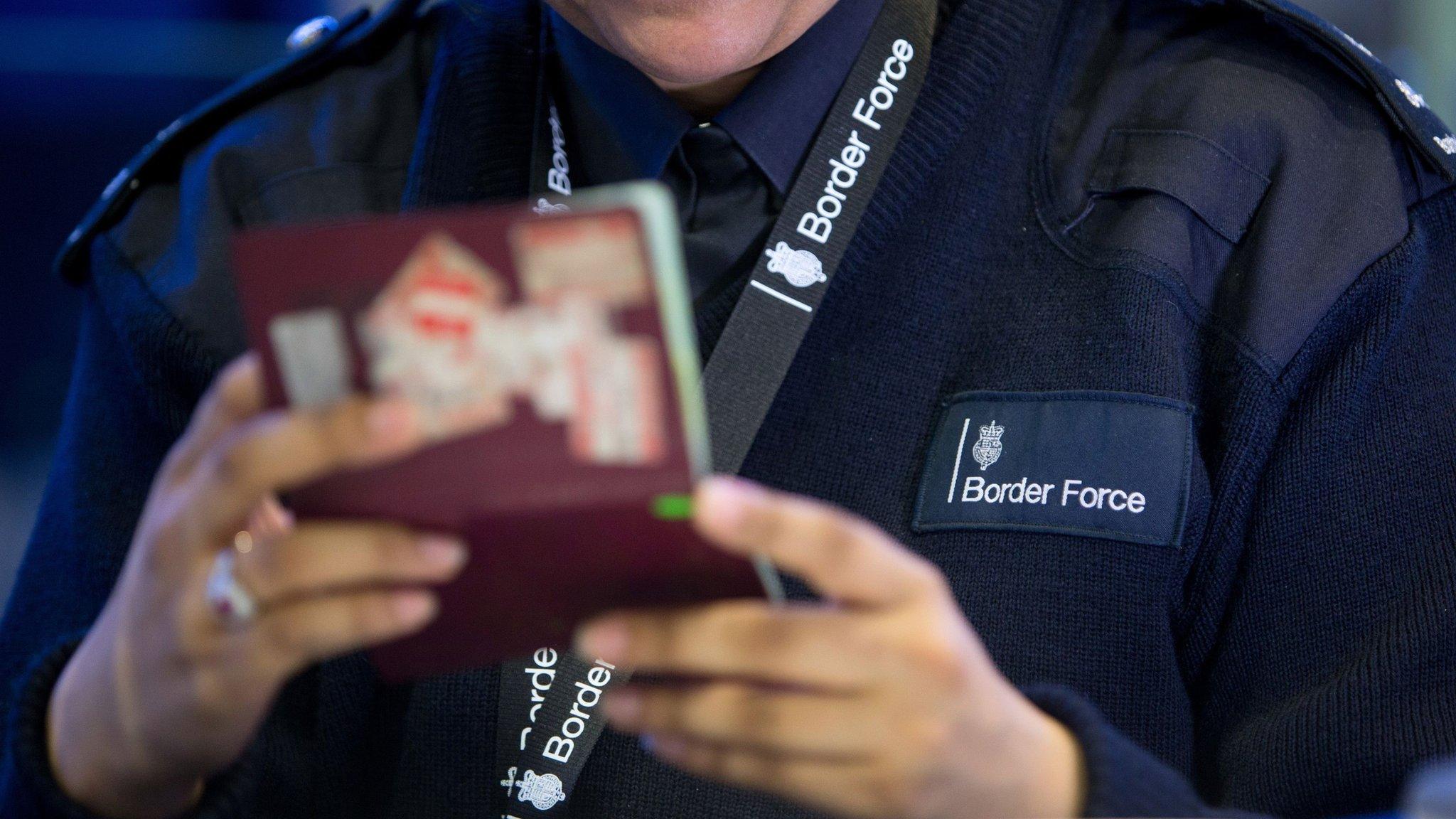
- Published28 November 2014
